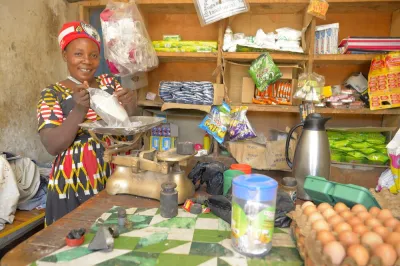Why Sistema.bio Decided to Forego MFI Partnerships

Biogas system producer Sistema.bio hoped its planned asset-based financing program would invigorate product sales to smallholder farmers in Mexico. But when the social enterprise sought microfinance institutions to supply capital and manage lending, the proposed interest rates approached 120% and loan application processing time seemed lengthy.
Sistema.bio’s CEO Alexander Eaton took a deep breath and decided instead to build the company’s own loan underwriting and repayment program to offer no-interest loans that better matched its social mission. Finance Director Esther Altorfer said it’s a decision nobody regrets.
“We’ve managed to increase sales (and) we see it even now, as we are expanding, to be a key competitive advantage (compared) to other biogas companies,” said Altorfer. “Through the whole loan appraisal process we (also) get to know our customers much better.”
As more social enterprises selling products to base of pyramid consumers offer asset-based financing to drive purchases, these first-time lenders are getting a crash course in loan-making and collections. They are finding that technology - mobile apps, cloud databases and SMS messaging - is helping turn asset-based financing programs into a core competence.
Cleantech companies like Sistema.bio (who uses TaroWorks' mobile offline customer relationship management software to help manage its business), are among the early adopters of consumer financing to drive product sales and mobile, cloud computing to help oversee lending operations.
Five steps to building consumer financing programs
Social enterprises can partner with a microfinance institution or bring the loan-making and managing process in-house. Organizations looking to build their own asset-based financing program will need to:
- Obtain sufficient working capital to finance the loans.
- Collect and analyze field data to build a loan recipient’s financial and behavioral profile.
- Employ methodology to determine the borrower’s creditworthiness, ranging from established credit scoring options to algorithmically driven “alternative data” scoring.
- Develop in-house risk assessment skills by training existing staff on loan underwriting and portfolio management or hiring people with prior experience.
- Build systems to monitor loan performance, facilitate timely repayment, manage field staff and strengthen customer relationships.
Asset-based financing can drive sales
Sistema.bio - which manufactures, sells, installs and services a biodigester that transforms animal manure into biogas for clean cooking and organic fertilizer - began its asset-based financing program in 2012. After a cash down payment, units are installed and farmers start seeing savings. Customers do not own the biodigester until completing 100% of subsequent installment payments. The goal is to incentivize small subsistence farmers to invest in an energy and fertilizer producing unit that generates enough savings to repay its cost (around $800) within 18 to 24 months.
When Sistema.bio decided to forgo MFI funding due to high interest rates and lengthy loan turnaround times, it partnered with the crowdsourced funding platform Kiva, which to date has provided more than $590,000 in no-interest loans to over 600 farmers and lending guidance that Sistema.bio’s Altorfer said accommodated her company’s social mission.

Mobile and cloud technology can support lending
As the loan program grew, Sistema.bio needed solid methodology to assess creditworthiness and use results to make loan decisions in real time – to not slow product sales momentum. It also wanted a way to monitor loan portfolio health to quickly identify potentially delinquent borrowers.
Sistema.bio, which had already been using TaroWorks to help improve sales, installation and maintenance, harnessed these same tools to:
- Build Credit Scoring System: The methodology is based on 20 factors collected on mobile devices by field staff who already interact with potential customers to determine their biodigester needs. Scoring factors include quantitative metrics like sources and cycles of revenue and expenses as well as qualitative measures including the health of the farmer’s animals and cleanliness of the farm.
- Develop Loan Data Dashboards: Once field data is uploaded, Sistema.bio checks online, real-time dashboards it created to gauge overall loan portfolio health - like total principal outstanding and delinquency rates. Using their system’s ability to transmit data to and from the field, Sistema.bio gives their field technicians access to current loan status information on their devices to remind the farmer when the next payment is due.
- Deploy Performance Management Tools: Sistema.bio’s credit coordinator can simultaneously send personalized SMS payment reminders to multiple customers with the same payment due dates. With TaroWorks’ field staff management functionality, Sistema.bio can also set sales team performance goals and show progress against those goals to both the sellers and their managers.
Sistema.bio has made significant progress from a time when it had no formal process for loan screening and origination. As a result, the percent of its loan portfolio that is on time increased from 64% to 73% within five weeks of several major process changes. Delinquency rates on new loans have dropped from at least 30% by the end of 2015 to zero as of Q3 2017.
Asset-based financing: Lessons learned
Altorfer said Sistema.bio has learned lessons that will help the company as it expands asset-based financing in Mexico, Kenya and Nicaragua:
- Understand Sellers’ Methods: Before developing an asset-based financing program, spend time with field sales staff to understand how they already assess creditworthiness of potential customers. Sistema.bio realized their agents had an internal checklist to screen for creditworthiness. The next step was to turn that thinking into words, criteria and credit scores.
- Don’t Scrimp on Training: If Altorfer could do things over again, she would have spent more time training people on the technology, as some adopted fast while others struggled, resulting in incomplete data collection that initially hampered credit scoring.
- Sweat the Legalese: Altorfer advises making sure your original customer contracts and other related legal documentation accurately reflect the new asset-based financing program and that loan terms and policies be easily accessible to team members and customers.


